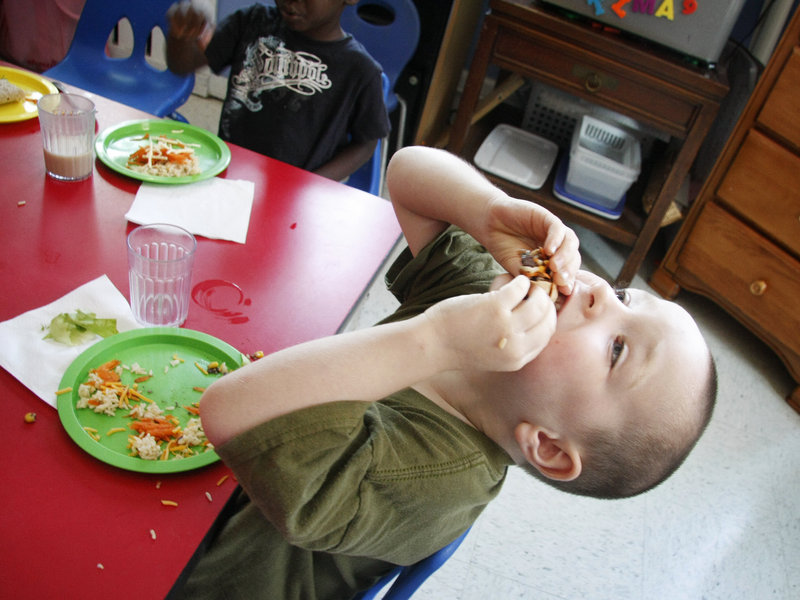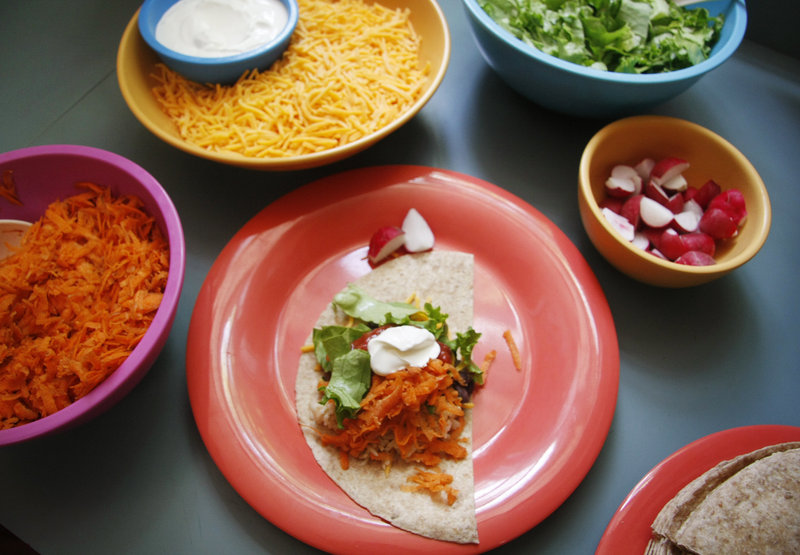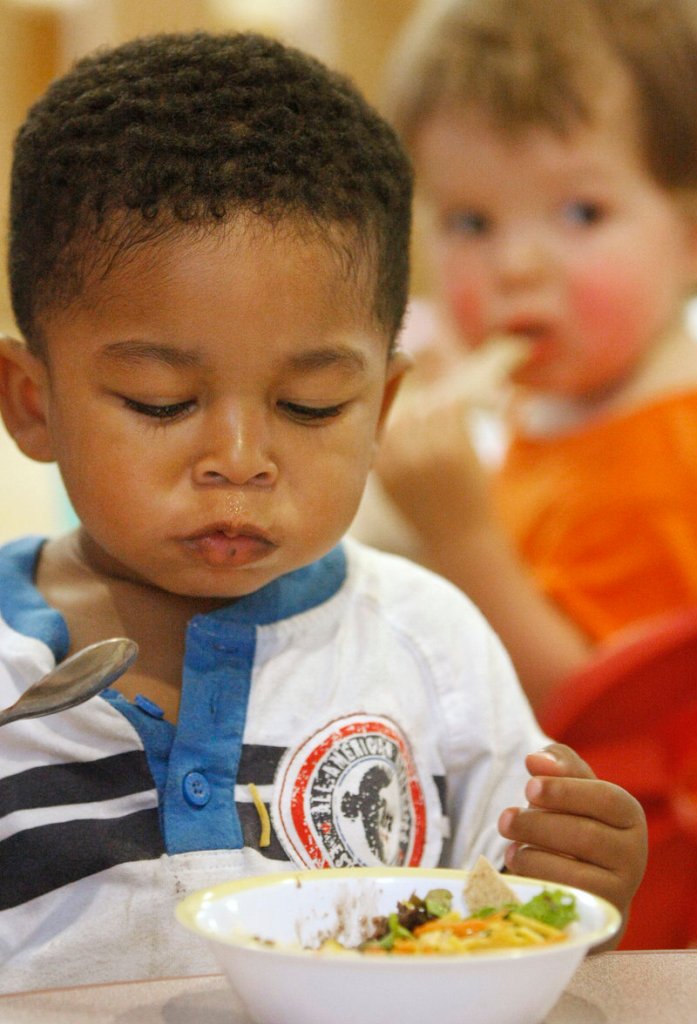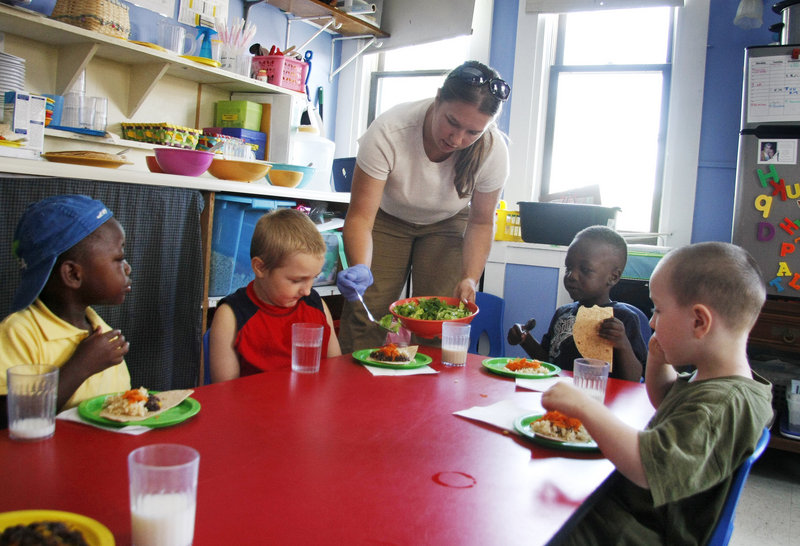Anyone who believes preschoolers won’t eat broccoli or kale, let alone try tempeh or quinoa, needs to take a trip to the Youth & Family Outreach daycare center in Portland.
During the past six months, the center has completely revamped its menus, eliminating processed foods in favor of whole and locally grown foods prepared from scratch.
The center serves children from 6 weeks to 5 years old and offers breakfast, lunch and a snack each day.
Five-year-old Nunga Zangada recently tried gazpacho for the first time. “I liked it a lot,” she said. “And I ate the fruits and I liked the salad.”
She’s not the only one enjoying the new foods.
“The feedback from the parents has been, ‘I can’t believe my child is eating this,’ ” said assistant director Michelle Greenlaw. “It’s inspired them to serve some of these foods at home.”
This is no surprise to K Yacks, the center’s cook.
“Kids do eat kale,” said Yacks, who has a degree in urban agriculture and political economy from Evergreen State College in Olympia, Wash., and worked for years as a chef in high-end restaurants in Chicago, New Orleans and Seattle. “We’re developing palates for this food.”
LOCAL ON A BUDGET
Sure, you may be thinking, this is all well and good for the children of yuppies and foodies, who regularly dine on sushi and spinach salads. But it’s not going to work if the children aren’t used to these foods.
The majority of the children at the daycare do not come from privileged backgrounds.
“Seventy-nine percent of our families are low income,” said Camelia Babson-Haley, the center’s director. “Everybody should be able to eat local, whole, healthy foods.”
The appeal of processed foods comes from both their convenience and the fact that foods loaded with trans fats and high-fructose corn syrup are relatively cheap.
But even with weekly trips to the Portland Farmers Market and purchases of organic food from Maine farms and suppliers, Youth & Family Outreach is only averaging $20 more per week in food costs.
“I want to go through a year and see if it really went up,” Babson-Haley said of the weekly costs. “Some of the meals are really inexpensive, like rice and beans. And if you’re eating in season, you’re eating what’s cheaper.”
The center’s food budget is $15,000 per year, which feeds 40 students and eight staff members five days a week.
“Our budget is really tight and getting tighter,” Babson-Haley said, noting that both grant money and government reimbursements are shrinking. “For example, it costs $300 a week to take care of an infant, and we get $200 a week from the state.”
It costs between $186 and $230 per week, depending on age, to send a child to the daycare center. Low-income families pay between $167 and $200 per week, which is generally covered by the state.
“One of the things that has made it more affordable for us is not eating meat every day,” Yacks said.
Meatless meals include dishes such as roasted chickpeas with turmeric potatoes, Costa Rican beans and rice, pesto pasta with black bean tempeh, and enchilada lasagna with local beans, cheese, sauce and spinach.
In addition to being budget conscious, Yacks needs to cater to a variety of special diets.
“We have dairy, egg and nut allergies” among the students, she said. “We also have some kids who don’t eat pork, and five vegetarians.”
When meat is on the menu, it comes from Hannaford’s Nature’s Place brand, which doesn’t contain antibiotics or growth hormones. Yacks serves it in dishes that include turkey sloppy joes and baked chicken breast with quinoa and steamed broccoli.
Breakfast brings offerings such as whole grain blueberry muffins, fresh fruit, cold cereal, hot oatmeal or whole grain vegan pancakes.
While whole foods and fresh vegetables abound on the menu, one thing in short supply is sugar. Sugary drinks and even 100 percent juice were eliminated years ago, and these days Yacks keeps a sharp eye on the amount of sugar in her recipes.
“I use 1/3 of a cup of sugar when I make 43 muffins,” Yacks said.
Birthday celebrations take place once a month, and rather than cupcakes, the kids enjoy fruit smoothies or fruit kabobs.
MAKING FOOD KID-FRIENDLY
“K has really worked with the teachers to help present the food,” Babson-Haley said.
A good example is the Thai chicken salad. The first time the toddler group was served this meal, they balked. But Yacks realized if the salad was separated into its constituent parts of rice noodles, chicken and leafy greens, the youngest students would be more willing to try these new foods. And it worked.
“It becomes, ‘Oh my gosh, my food is fun,’ ” Yacks said.
One of the first changes the center made involved its bread purchases.
When Yacks took over the kitchen post, she discovered that the only breads in the organization’s price range contained high-fructose corn syrup, a highly processed sweetener that has been linked to obesity in medical studies.
She found a Nature’s Place bread that didn’t contain any artificial ingredients, but it came with a $2.99 per loaf price tag.
Then she met the folks who run the Portland-based Bomb Diggity Bakery, which employs people with intellectual disabilities to make baked goods using all-natural ingredients. Yacks was able to work out a deal to buy whole grain bread at the wholesale price of $2.25 per loaf.
The purchasing agreement has since been expanded to include granola bars, English muffins, wheat rolls and hamburger buns. All the baked goods are free of dairy, eggs and nuts.
“I don’t use ketchup on anything, and I’m making all the salad dressings from scratch,” Yacks said.
Since those scratch-made dressings include miso-thaini and buttermilk ranch, it’s no wonder the youngsters are gobbling up their veggies.
Changing to minimally processed foods has also required some creative maneuvering.
“When we switched to natural peanut butter, we had to put it in a Skippy jar for the first month,” said Greenlaw.
Babson-Haley sees another challenge in maintaining such a high-quality meal program.
“We can’t afford to pay K what she deserves to be paid,” Babson-Haley said.
At the end of the month, Yacks will be leaving her post to move to New York City. Babson-Haley intends to look for a similarly minded person to carry on the innovative food program.
RESTORING FOOD CONNECTIONS
The Youth & Family Outreach students tend a series of raised beds along Preble Street, and the fresh vegetables they grow show up in their lunches.
“One of the big issues with food is we’ve lost the connection to where food comes from,” Babson-Haley said.
The center’s new food program wants to restore this connection by introducing the children to farmers and food suppliers and teaching them how to compost.
“Our compost goes to the farm, and the farm’s produce comes here,” Yacks said. “They’re seeing the full cycle.”
Lual Maker, 5, appreciates knowing where his food comes from and where it goes.
“I like when they bring the English muffins,” he said of the deliveries from Bomb Diggity Bakery.
Lual, like many of the students, has become an expert composter. When asked what can’t be put in the compost bins, he doesn’t hesitate before saying, “no milk, no meat and no water.”
As Yacks said, “This is the future of our food.”
Staff Writer Avery Yale Kamila can be contacted at 791-6297 or at: akamila@pressherald.com
Follow her on Twitter at: Twitter.com/AveryYaleKamila
Send questions/comments to the editors.







Success. Please wait for the page to reload. If the page does not reload within 5 seconds, please refresh the page.
Enter your email and password to access comments.
Hi, to comment on stories you must . This profile is in addition to your subscription and website login.
Already have a commenting profile? .
Invalid username/password.
Please check your email to confirm and complete your registration.
Only subscribers are eligible to post comments. Please subscribe or login first for digital access. Here’s why.
Use the form below to reset your password. When you've submitted your account email, we will send an email with a reset code.